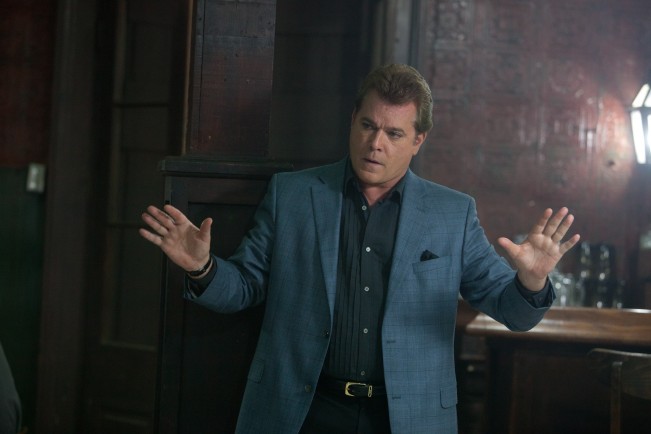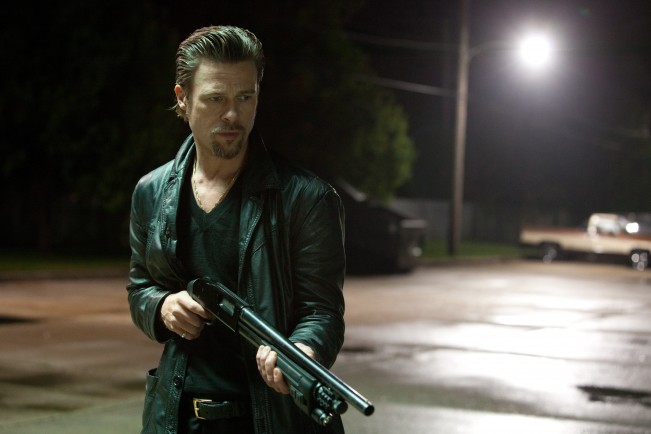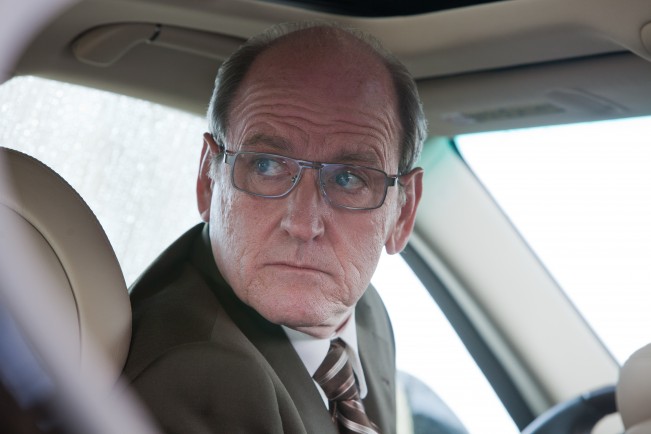

By Mike Wilmington Wilmington@moviecitynews.com
Wilmington on Movies: Killing Them Softly
KILLING THEM SOFTLY (Three Stars)
U.S. Andrew Dominik, 2012
In Andrew Dominik‘s Killing Me Softly, a crime movie without alibis, people die suddenly and meanly, very meanly — sometimes with their blood and brains splattering like a Sam Peckinpah death ballet across the dark frames, sometimes after being kicked and beaten almost senseless, sometimes fast and straight up, with a shot in the head. We’re in Hell, U.S.A. It’s an ugly world, sometimes a funny one and a brutal one, even when Ketty Lester’s heart-tearing rendition of Victor Young‘s “Love Letters“—with Floyd Cramer on piano—is on the soundtrack. And it’s a bent, greedy world revolving around money and power, with a lot of the mayhem coming from a cool deadly guy named Cogan.
Cogan is the cynical hit man played in the movie by Brad Pitt. He was also the main character in the novel “Cogan’s Trade,” by George V. Higgins, the classic 1974 crime novel from which New Zealand-born writer-director Dominik drew the scenario for Killing Them Softly—as bleak and rough a modern neo-noir as I’ve seen recently. Pitt plays him as a deadpan-sexy, no-nonsense sometimes acid-tongued killer who insists ”very few guys know me.” (Damn straight; not healthy.) He has been hired to kill two dumb low-life crooks who made the mistake of knocking over a mob-run poker game. The hapless pair: a gabby driver named Frankie (Scoot McNairy) and an out-of-control Aussie junkie named Russell (Ben Mendelsohn),
Other guys will have to get whacked too, including Frankie and Russell’s boss Johnny Amato (Vincent Curatola) who runs a legit dry-cleaning business, and who made the mistake of hiring these two irresponsible jerk-offs to pull the robbery. And there‘s also the guy who runs the poker games, Markie Trattman (Goodfella Ray Liotta), who made the mistake of robbing his own mob-run game one other time in the past, which means, for the sake of public relations, Markie has to get iced too.
 You need a painstaking workman to handle multiple stuff like this. So the mob, through their dourly efficient attorney Driver (Richard Jenkins), engages the classy operator Jackie Cogan, who farms out one of the jobs to the once-first class killer, his friend Mickey (James Gandolfino). Mickey though, has unfortunately lost it. He’s turned maudlin drunk and hooker-happy and he has to be he replaced. Cogan is up to that too (“I like to kill them softly, from a distance,” he says, explaining his modus operandi.).
You need a painstaking workman to handle multiple stuff like this. So the mob, through their dourly efficient attorney Driver (Richard Jenkins), engages the classy operator Jackie Cogan, who farms out one of the jobs to the once-first class killer, his friend Mickey (James Gandolfino). Mickey though, has unfortunately lost it. He’s turned maudlin drunk and hooker-happy and he has to be he replaced. Cogan is up to that too (“I like to kill them softly, from a distance,” he says, explaining his modus operandi.).
All of this, in Higgins’ novel, took place in the Boston criminal underworld, which Higgins, a former Assistant U.S. Attorney for Massachusetts (and a prosecutor, a defense lawyer, a newspaper columnist and a teacher) knew very well. While investigating local criminals and sending some of them to stir, Higgins listened to them—soaked up their clipped, brutal lingo—and that’s where we get this movie‘s many terse zingers and brass-knuckle gems.
For financial reasons (apparently), Killing Them Softly, the movie has been transplanted to New Orleans and the year changed reset from 1974 to 2008 in the post-Hurricane-Katrina, post-financial crash period of U. S. history. (We see President George W. Bush and presidential candidate Barack Obama on CNN in the local bars, instead of sports, which seems strange.) The city we’re in, dark and barren and a real City of Night, seems more generic, an Everycity. The streets are in New Orleans, but the people and their talk, the verbal rhythms and the nasty slang, still remind you of Boston. Now, you ask me, I think they should have spent the extra money and shot the whole think in Boston, or even recreated Boston on a sound stage. But then, I‘ve never been good with money. Neither was George W. Bush.
It’s not a bad movie though. Pretty damn good, you ask me. George V. Higgins was one terrific S. O. B. of a writer. And this is one of his top books. Elmore Leonard no less called “The Friends of Eddie Coyle,“ Higgins’ first novel—or his fifteenth, if you count the fourteen he says he wrote earlier and threw away—the best crime novel ever written. (You’ll recall that Peter Yates made Friends of Eddie Coyle into a hell of a 1973 movie, with Robert Mitchum and Peter Boyle,) Higgins is famous for his realistic stories and characters, his flawless Boston atmosphere, his terse understated style—and his beyond-Hemingway dialogue, which almost everyone thinks is great. (Me too.)
“Cogan’s Trade” is first-class material. And Dominik can be an ace hard-boiled, high-style director. (“Hard-boiled, high style”: That’s the essence of noir.) I liked his last movie, the grin, artful 2007 Western The Assassination of Jesse James by the Coward Robert Ford, which also starred Pitt, as Jesse James, Casey Affleck as Ford, and had the same gray, violent, cheerless, murderous feel as this movie. So it didn’t bother me that Dominik’s show has a lot of talk and relatively little action, that it has a sense of character and that it didn’t have a shootout every 20 minutes. Who needs all that shit anyway? I hear the original cut was two and a half hours, more like Jesse James, and I bet the long cut was better and I bet that it even plays faster. Sometimes you don’t make a long movie go quicker by cutting it. You just screw up the connections. Remember Once Upon a Time in America? I rest my case.
Greig Fraser’s cinematography is good neo-noir stuff. Hard-boiled; high style. But the script carries the movie, and the acting. Gandolfino is great. Jenkins: nobody does a pill like this guy. Liotta: give him more lines. And, as for Pitt: the guy can act definitely and he‘s a movie star, definitely, and wait until you hear him say the line about America isn‘t a country, it‘s a business, now pay me (May not even have been a Higgins line, but is expresses the what-the-fuck, the gestalt. It sounds right, smells right.) Nobody says that line better, not even that showboat Clooney. Well, Mitchum would have said it better, but he had a deeper voice, and he was better at accents, you know. So who cares, there’s not more shooting? There’s enough. You know?















